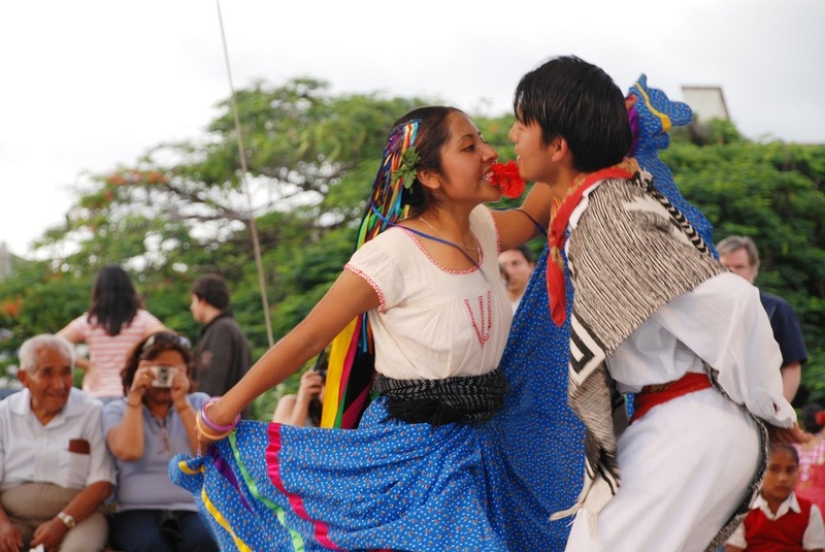9 land languages with bizarre features
Categories: World
By Pictolic https://pictolic.com/article/9-land-languages-with-bizarre-features.htmlAnyone who has ever tried to learn a foreign language knows how difficult it is. Even in the simplest of them, the study of verb endings alone can take a good half of the year. And this is only among European languages! If we digress a little from the Indo-European group, you can find examples of such grammatical rules that can truly drive you crazy.

 Members of the Tuyuka tribe
Members of the Tuyuka tribe
When we teach children our native language, we explain simple things to them even more simply. In children's books, you can find sentences such as "a boy plays with a ball." When the kids learn to understand simple statements, we can move on to more complex structures. But in the Tuyuka language, everything is completely different. From the very beginning, from the very first sentences, absolutely everything must be explained.
The Tuyuca language is spoken by less than a thousand people, and it does not allow you to simply assert something. You must state where or how you learned this. For example, instead of saying "The boy is playing ball," you should say something like "The boy is playing ball, and I know this because I can see him." In a similar way, the conditional model “The boy plays the ball, I guess” is built, which has a slightly different shade of meaning than in Russian.
And this is not the only feature of tuyuki. According to some estimates, there are 140 genders in this language, among which there is one specially allocated for objects that resemble the removed bark of a tree.
 Chalkatongo native speakers
Chalkatongo native speakers
Have you ever wondered how easy it is to ask a question in Russian? Think now. Almost all of you paid attention to word order and even remembered intonation. But if we spoke Chalcatongo, you would surely feel confused. There are no question markers in this language.
Of all the languages of the small peoples of Mexico, Chalcatongo is the best studied, one can find at least one study on grammar, but nowhere is there any mention of grammatical indexes of general questions (requiring answers "yes" or "no") in this language. Such questions themselves, of course, exist, but there are no features of intonation, special sentence members, inversions, or interrogative words that would help you determine whether an answer is expected from you. This can only be understood from the context.
 australian aboriginal
australian aboriginal
The languages of the Australian peoples are unique due to their almost complete isolation for tens of thousands of years. Although they are not the most incomprehensible languages, they still sound very strange to Europeans. And their grammatical structure includes many affixes that are absolutely alien to Germanic or Latin roots. As the Encyclopedia Britannica writes, most of the aboriginal languages also have absolutely no fixed word order.
In practice, this means that speech can jump, flow and change, like jazz improvisations, words can appear anywhere in the sentence at the speaker's sole desire. That is, instead of the usual sentence “This jumping language is pretty amazing”, you could say “This jumping language is pretty amazing”, or “This jumping language is pretty amazing”, or in any other variation. And your interlocutors would still understand you.
In fairness, I must say that the rules in this language still exist. Just like the basic structure rules for jazz improvisations, Australian Aboriginal languages require the addition of certain suffixes to help people decipher your statement. But once you master them, you can put the words in absolutely any order.
 Thai king
Thai king
It is difficult to say with any objectivity why the king is so popular in Thailand. On the one hand, people talk about him with great love, on the other hand, he put an end to ten conspiracies, and the law forbids talking bad about him. However, this duality does not arise in the language, because Thai has a special pronoun form to refer to the king in an abstract conversation or to refer to him personally.
The so-called rachasap, or "royal language", has been around for over 700 years, and in all this time it has hardly changed. It uses various combinations of old Khmer words and prefixes along with common Thai roots, making it both similar and unlike other forms of the language. Although almost all Thais understand rachasap quite well, it seems to be difficult to speak due to the lack of opportunity for most Thais to practice (how often can one chat with the king?). Nevertheless, it is still regularly used in news and various reports about the king's life.
 Berik native speaker
Berik native speaker
The Russian language, like many European ones, is rather ambiguous. When someone asks us where we've been, we can simply say, "I was at the bar," without specifying that I was sitting "until they kicked us out, and that's why it got bad on the street." But not all languages have such gray spots. For Berik speakers in New Guinea, it is simply necessary to indicate exactly when an action took place.
This happens because sentence tense is indicated by the end of the verb, and most often it is impossible to construct a phrase without this vital information. Therefore, while in Russian we can say: “I went in for a drink,” on the berik it is simply necessary to clarify “I went in for a drink in the middle of the day.” And it's not limited to timing. When it comes to objects, the verb endings also indicate their size and quantity, so you can convey the phrase “I gave the girl six roses in the moonlight” in one word!
This confusion is completed by the indispensable requirement to indicate the place for some verbs. This means that your interlocutor will immediately know not only where and when the actions you describe took place, but also how many and what objects were involved in this. With such a specific grammar, any gray spots will simply turn white ...
 Bedouin
Bedouin
Although the Russian language has several hundred thousand words, the number of sounds is still quite limited. The phonetic set of Russian vowels and consonants has only 42 sounds, and they are quite enough to build various words and sentences, like from Lego blocks. All languages on earth are built in this way... but not al-Sayyid sign language.
This language is spoken by only a handful of people in the Negev region of Israel, and there is not a single repeated character in it. If you're trying to figure out what's amazing about this, imagine that every word in this article appears in a unique sound and spelling. In this Bedouin language, sounds do not repeat, there is not even a so-called schwa (a middle vowel of the middle rise, similar to something between “a”, “e” and “o”), common in European languages. This is al-Sayyid: every noun, verb and pronoun has its own unique gesture, in which there is not even a small part of any other.
But what's really amazing is that other similar sign languages use the same Lego method of constructing long words and phrases as natural ones. Some of the scholars suggest that al-Sayyid is simply a very young language, and things will change as its speakers move away from such gestures. However, nowadays it still remains surprisingly unique.
 Inhabitants of the Piraha tribe
Inhabitants of the Piraha tribe
This language is spoken by only one tribe in Brazil, but it is unique in many ways, if only because it has absolutely no concept of time.
This means that it is simply impossible for the speaker to construct a sentence that unfolds in time from the past to the future. If we need to say something like "I promise to do this work after I read this post", in Pirahana we can only say "I'm finishing the post, I'm doing the work." There is no way to determine whether you have already finished work, are currently working, or just about to. All speech is firmly trapped in the present moment.
The result of this is a culture that knows next to nothing about its past or future. According to linguist Daniel Everett, who lived among the Piraha people for seven years, "the whole experience is being turned on now." Pirahã mothers don't tell tales, men don't brag about their past victories, and children almost immediately forget about grandparents as soon as they die. Although this culture is now open and changing thanks to the Brazilian government's educational project, it is not known how all these new trends will affect the pirahão.
 Inhabitants of Germany
Inhabitants of Germany
Although German is relatively close to English, which we all learn from childhood, it no doubt causes a lot of problems for learners. One of them begins with the use of complex words. In German it is quite normal to say something like: Rindfleischetikettierungsüberwachungsaufgabenübertragungsgesetz
This 63-letter word stands for the Delegation of Cattle Supervision and Beef Labeling Act. But even such difficult-to-pronounce tongue twisters lose out to German sentences, which not only can last forever, but also keep you in suspense until the very end.
By the irony of syntactic construction, German verbs appear at the end of a phrase. So, instead of saying "I played football at my father's house on Thursday," you would say something like "I played football at my father's house on Thursday." This is easily understood in short sentences, but becomes difficult in longer ones, and some German utterances seem to go on forever. First you have to go through all the details of when, where, how, why, and for whom something happened before finally discovering that something just happened.
And to completely finish off the reader, the denial is put at the very end, so you can spend two whole minutes deciphering a complex story only to realize that none of this actually happened. It's like listening to a long convoluted story only to find out at the end that you weren't really told it.
 Burushaski native speakers
Burushaski native speakers
The northern Pakistani language Burushaski, which is spoken by about 90,000 people, is quite unique. Linguists have still not been able to find a genetically similar language, which is even more impressive when you realize that even the strangest languages belong to some kind of language family. Burushaski has a number of features that are foreign to the Russian way of speaking, the most famous of which may be his sensitivity to noise.
In Russian, we tend to use sound for amplification and description. We can say "the door opened softly" or "the door creaked open" or even "he heard the door open". For Burushaski speakers, this is not possible. In this language, the word itself changes depending on whether the action was performed loudly or quietly.
Take, for example, the same door. In burushaski there are three separate words for a door: one is used when the door is opened very quietly, another is used when it is just quiet but not too quiet, and the third is when the door is opened loudly. In this way, very precise meanings of statements are often achieved, especially if something very noisy is being said.
Recent articles

It's high time to admit that this whole hipster idea has gone too far. The concept has become so popular that even restaurants have ...

There is a perception that people only use 10% of their brain potential. But the heroes of our review, apparently, found a way to ...

New Year's is a time to surprise and delight loved ones not only with gifts but also with a unique presentation of the holiday ...